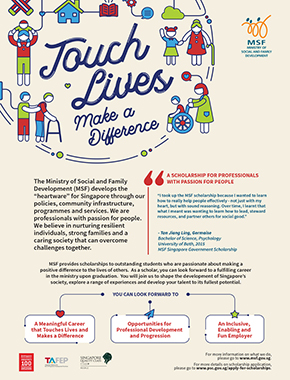Ng Chuan Ling helps people recover mentally as a Forensic Psychologist. She is a MSF-SGS Scholar, and holds a Bachelor of Science (Hons) in Psychology from University College London as well as a Master of Psychology (Forensic) from University Of New South Wales.
We all know that the success of Singapore is hinged heavily on its people. This is why the work done by the Ministry of Social and Family Development (MSF) is of paramount importance.
The MSF develops the “heartware” for Singapore through their policies, community infrastructure, programmes and services. The aim is to nurture a resilient and caring society that can overcome challenges together. For one, the ministry has a slew of measures to help people in need amidst the Covid-19 outbreak.
Helping MSF deep dive into the minds of people in Singapore is Forensic Psychologist, Ng Chuan Ling. She works at the Centre for Trauma Recovery (CTR), which provides psychological services to children, youth, vulnerable adults and families who have been impacted by trauma or abuse.
BrightSparks caught up with the 26-year-old, who shared her experience working at MSF and her journey so far as a recipient of a MSF-Singapore Government Scholarship.
Firstly, how did you get interested in psychology?
Honestly, I don’t remember when I started being interested! I have always been keen to work and interact with people, and always wondered about their different experiences and behaviours. After doing a somewhat-relevant academic paper, hearing a career talk, and an internship, I figured that I would love to study Psychology and see where it takes me.
It was only during my undergraduate degree that my interest grew much more through my modules and professors. That’s when I became much more confident that I wanted to practice as a psychologist. I returned to my current department as an associate psychologist after my undergraduate degree.
Thoughts about pursuing the forensic pathway only arose after plenty of conversations with colleagues, exposure to working with clients within the legal system, and of course, the opportunity to pursue a postgraduate degree in Forensic Psychology.
You took on a MSF-Singapore Government Scholarship before heading to study at University College London. Tell us more about your scholarship application journey.
My junior college organised frequent career talks. One of them was on ‘Being a Psychologist’ and was presented by someone from my current department (CTR). I don’t remember much of the content presented, but I remembered being awed by that person’s experiences and perspectives, and left the talk feeling intrigued and inspired. That’s when I looked more into MSF and their work.
During my year, I was blessed that MSF was offering scholarships for individuals who were keen to pursue work in the social sector, in particular, Psychology or Social Work. By then, I was already interested in Psychology and managed to expose myself to the field through a three-month internship. I figured that’s something I wanted to pursue, and hoped to do it overseas for varied exposure. My academic grades weren’t the most exemplary, but I thought I’ll take a shot and applied. And, I’m glad I did.

An Open Mind
Chuan Ling heads to vast spaces to calm her nerves, and she has been to many around the world.
You also pursued a Master of Psychology (Forensic) at the University of New South Wales in Australia. What was the biggest takeaway from your university days?
Definitely the people I met! Studying overseas in two different countries exposed me to many different individuals of different ages, cultures, passions, and life stories. These included other Singaporeans, overseas friends, professors, even those that I volunteered with, and the clients I met while on my forensic placements. They widened my perspective so much, and there are so much to learn from every single one of them.
Similarly, in my current work, I meet many clients who all have their own life stories and experiences that shaped them. It reminds me to always, always be open and curious.
Speaking of work, tell us more about your role and responsibilities.
My job as a psychologist involves conducting clinical assessment and treatment for high-needs individuals and families with experiences of abuse and trauma. This also includes working with other professionals to support the young person and their families for extended lengths of time.
One mindset I have is to always look out for “wins” – small incidences or achievements that could be celebrated. That helps me to remember growth and progress both in myself and my clients, even when it comes slow! I have always felt it’s a huge privilege to be in my role as a Psychologist – that clients are willing enough to share their stories, which are more often than not extremely difficult experiences, and willing to let me witness their growth from these experiences.
And, how’s the work culture at MSF?
People are open, supportive, and warm to one another. Many of the people I work closely with work with vulnerable clients daily. We are well aware of the difficulties involved in each other’s work outside of the office and try our best to watch out for and support one another! There’s also plenty of flexibility in place to allow for a better work-life balance.
What possibilities are there for prospective scholars looking to join MSF?
You get opportunities to work beyond your job role on inter-department and interagency projects. This means wider exposure to other colleagues who have completely different job roles and greater learning. There is also flexibility for you to move into different roles within your ministry, or cross-ministry. While this is not scholar-specific, I am currently seconded to Boys’ Town Therapeutic Group Home, a residential care service for adolescent boys. Although I have previously worked with clients living in residential settings, being seconded allows me to build stronger relationships with the residential staff and clients, understand the challenges from the ground, and also gain more insight on how different community partners work.
Finally, any words of advice for students?
Be clear with yourself – think about why a scholarship may benefit you and your hopes for your work life. Then, think whether MSF may align with your hopes and values. MSF is a great workplace who does great work. However, it is a huge and difficult decision to apply for a scholarship when you are in pre-university as there are loads of unknown and opportunities ahead of you as you enter university. Think it through, and if you decide this is for you, don’t look back!


